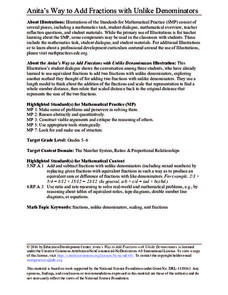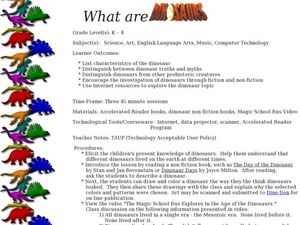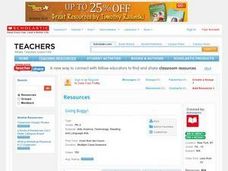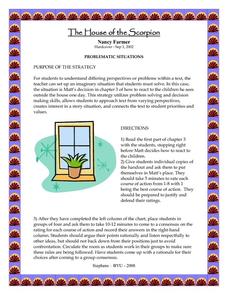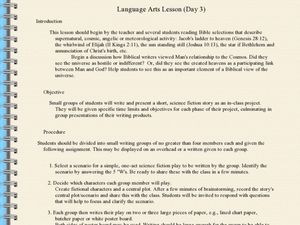Education Development Center
Anita's Way to Add Fractions with Unlike Denominators
Could you develop your own way to add fractions with unlike denominators? An in-depth task has scholars examine a fictional conversation between several people in which they discuss a method of adding fractions with unlike denominators....
Concord Consortium
The Six Faces of Amzora
Here's a task that is out of this world! Given a description of a fictional cube-shaped planet, scholars answer a set of questions about the planet. They create a two-dimensional map and consider the distances between locations on the map.
Curated OER
What are Dinosaurs?
Students explore the attributes of dinosaurs. For this dinosaur lesson, students read books and watch videos featuring dinosaurs. Students also research dinosaur traits using Internet sources.
Curated OER
Buoyant Behavior
Combine science and literature with this lesson on buoyancy. Read There's an Ant in Anthony by Bernard Most to examine words containing the letters a, n, and t. Then introduce your class to the word "buoyant." Demonstrate how an egg...
Curated OER
Over in the Meadow
Students discover how to locate books on meadow and pond animals and research them. Students discover how to locate fiction/story books about the animals mentioned in the counting book read. Students discover how to locate by author,...
National Center for Case Study Teaching in Science
To Boldly Go, or Not
Here is a different way to combine social studies and science. Have your high schoolers read a passage about the 2004 vision for space exploration and then discuss the practicality, costs, and reasons for returning to the moon. Then, the...
Curated OER
Going Buggy
Pupils identify the parts of a dragonfly that they drew. They write a very short non-fiction story (mainly with pictures) about the adventure of a dragonfly. They interview a person dressed as a dragonfly to find out some things about...
National Center for Case Study Teaching in Science
Life on Mars
Through reading and discussion, aspiring astronomers consider the question of whether or not there was ever life on the planet Mars. Throughout the process, they review how scientific investigations are carried out, examine the...
Curated OER
Sailing, Sailing
In this sailing lesson, youngsters read The Wreck of the Zephyr, and attempt to predict the outcome of the story. They draw a picture of a sailboat, identify its characteristics, and write their own fictional sailing story.
Curated OER
Don't Slip!
Students measure, record, and graph the force of moving a block of wood along sand paper. In this friction lesson plan, students read a spring scale, collect data, construct a graph, and propose a model to explain how fiction works.
Curated OER
Summarize This!
Young scholars explore how to summarize a reading passage. They read non-fiction books. Students use a Venn Diagram to compare and contrast the two animals they read about. They write a summary using the information in their Venn Diagram.
Curated OER
Reading Through Rainforests
Students investigate the concept of the rainforest through the use of nonfiction texts. The teacher reads to the class to give some information. Then they read their own books to find further information and perform the follow activities...
Curated OER
The Beautiful Moon: Story and Comprehension
In this beautiful moon: story and comprehension instructional activity, 3rd graders read a one passage about moon facts, then answer 5 multiple choice questions, with answer key provided.
Curated OER
Genre
In this genre study PowerPoint presentation, students read the definitions and characteristics of each literary genre. There are 17 genres that the PowerPoint presentation addresses, such as science fiction, tall tales and poetry.
Curated OER
Kid Lit Crit
Students explore different types of student literature; they then write their own fiction pieces, in either fantasy/adventure or memoir/realism style.
Curated OER
Bank On It! Worms
In this science worksheet, students fill in 6 blanks to complete an article about worms. They select words from a word bank. Students must use knowledge punctuation and syntax to put the words in the correct blanks.
Sundance
Teaching Strategies: The Giver
Can utopia be achieved? Included here are three literature worksheets to pair with Lois Lowry's The Giver. Pupils work in groups to come up with solutions to society's issues, individuals back up a statement related to a topic in the...
PBS
Exploring the Drive to Create in Frankenstein
Is it hubris that drives the creative process? Is it the desire to be remembered long past death? An interactive asks readers of Mary Shelley's novel Frankenstein and Percy Shelley's poem "Ozymandias" to consider what this wife and...
US Department of Agriculture
George Washington Carver Coloring and Activity Book
Learn about the interesting life of George Washington Carver and his many accomplishments with this series of worksheets for primary grade learners. From coloring pages and word searches, to non-fiction reading passages and math skills...
Novelinks
The House of the Scorpion: Problematic Situations
What should Matt do? Readers of The House of the Scorpion are offered several possible actions Matt could take when he first sees the children outside the house. They rate the options and then meet in groups to discuss the reasons for...
Scholastic
Lesson Three: The Earth, Movement in Space
If you feel like you're standing still, you're wrong! The Earth is constantly rotating and orbiting under our feet. Demonstrate the Earth's movement within the solar system with a collaborative activity. With a candle or lamp in the...
Planet e-Book
1984
An eBook edition of 1984 is now available for classroom use. George Orwell's famous dystopian novel is downloadable for free for individual computers, tablets, or phones.
Curated OER
Bible Readings: Supernatural, Cosmic, Angelic, Meteorological
Students create and present a short science fiction story. In this Bible studies lesson students work in small groups and are assigned characters and a scenario to develop a play about.
Curated OER
Real or hoax?
Seventh graders brainstorm a list of criteria that makes a webpage useful for research and not useful for research. They complete the activity, "Real or Hoax," and discuss fiction and non fiction stories and determine which websites are...


